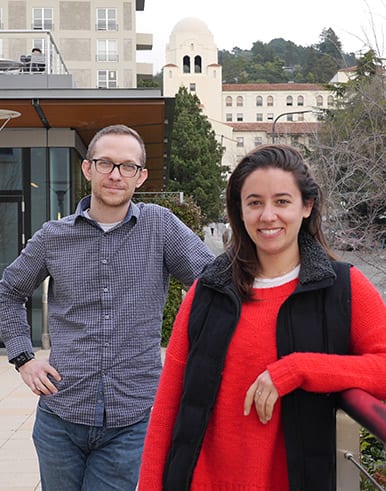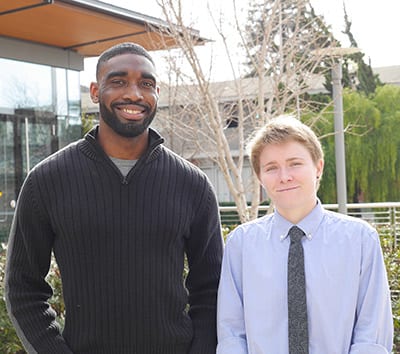By Andrew Cohen

Unlike most law schools, where students must wait until their second year to engage in hands-on clinical work, Berkeley Law lets them dive right in. The school’s 31 Student-Initiated Legal Services Projects (SLPS)—open to all class years—develop key career skills while serving underserved groups and individuals.
The community-facing pro bono projects involve direct client service, legal research, educational outreach, and community organizing. Overseen by supervising attorneys, they confront a broad collective landscape, from housing and juvenile justice to immigration and human trafficking.
Two new SLPS are eager to make their mark, and early signs appear promising for the Homelessness Service Project (led by Stephen Dockery ’19 and Danielle Craig ’20) and the Berkeley Police Review Project (led by Emily Storms ’19 and Kristoff Williams ’18).
“These initiatives are absolutely important to our school’s public mission,” says Kristen Holmquist, Berkeley Law’s director of experiential education. “Many students come here because they want to make a difference in the world. The opportunity to have these experiences right away reminds them of their motivations by exposing them to clients who need help navigating difficult legal situations. And in the process, many of those clients’ lives change for the better—in big and small ways.”
Filling the homeless gap
With a growing number of California cities criminalizing homelessness in various ways, Dockery “noticed a gap in the SLPS offerings for a project that focused specifically on the problem.” As a 1L, Dockery volunteered with a UC program that helped homeless people at the Suitcase Clinic near campus.
There, he heard concerns and uncertainty about where the homeless could sleep as well stories of harassment by the public and police. He calls the Suitcase Clinic “a fantastic community that helped cultivate a vision for a larger legal project that would go to homeless- and low-income communities to provide assistance.”
The leaders of Berkeley Law’s Pro Bono Program, which includes SLPS, fosters independent student projects, and cultivates other pro bono opportunities, helped Dockery and Craig find supervising attorneys and register as an official student organization. After starting with six volunteers last semester, the group’s student roster has doubled.
“Our members have been fantastically dedicated,” Dockery says. “Their work includes helping clients seek out other legal assistance or take the first steps in advocating for themselves in local courts.”
Homelessness Service Project students work on areas such as outstanding criminal matters, inquiries about current parole status, personal injury and torts, and unlawful evictions. They also help clients obtain veteran status, acquire medical benefits, or collect monetary damages from previous civil matters.
“And that’s just to name a few,” Craig says. “We see it all.”
With more students in tow, the group can now provide legal consultation and referral services at three Berkeley locations—the Suitcase Clinic, Suitcase Women’s Clinic, and Multi Agency Services Center—and will soon conduct outreach at local homeless encampments.

“The opportunities for hands-on clinical experience as a 1L is one of the reasons I came to Berkeley,” Craig says. “This experience allows me to contextualize some of the things I’m learning in my doctrinal courses and provides an opportunity to practice my research and client-facing skills … It’s a motivating reminder of exactly why I went to law school.”
Important allies
The Boalt Police Review Project helps represent civilians who file misconduct complaints with the Berkeley Police Review Commission. The commission provides a forum for investigation and adjudication, and students advocate for the complainant when cases reach a hearing.
“Police misconduct has been a hot-button issue lately, and there was a gap with respect to offering representation to community members who felt like they’d been wronged by the police,” Williams says.
Client complaints include improper arrest, search, seizure, or stop; improper or inadequate investigation; improper detention procedures; improper police procedures; excessive force; discrimination; harassment; and discourtesy.
Former SLPS Coordinator Diana DiGennaro ’06 discussed the project idea with Williams and Storms, reached out to the Police Review Commission, and gained approval for a student advocacy group. Williams notes that “much of our early work consisted of pushing the commission to actually notify potential complainants that a group such as ours existed.”
Project students review the complaint and some of the evidence collected by the commission, interview the complainant, and submit new evidence and witnesses. They prepare clients for the hearing and appear on their behalf—presenting an opening statement, a direct examination, and a closing statement. Students may also make objections to officers’ cross-examination of the complainant, and raise procedural questions.
In addition to developing oral advocacy, communication, and related skills, such practical training “allows students to really feel the weight of what they’re doing,” Storms says. “There’s something about working with real people, knowing that work will have an actual impact on their lives, which teaches an invaluable lesson about what being a lawyer really means and the responsibility it entails.”
She adds that, “Generally, people have been very welcoming of our project. Though we received a bit of resistance from some higher-up City of Berkeley employees, members of the Police Review Commission—who themselves are Berkeley citizens—have been very supportive. I think, given the rise of public awareness of police misconduct across the country, many people agree that police accountability is vital.”
For Williams, the most vital part of the group’s work is “empowering our clients simply through our presence. Walking into a hearing, where typically multiple police officers and their representatives are present, can be intimidating. Having someone walk into that hearing with them, knowing they’re not alone, brings our clients great comfort.”